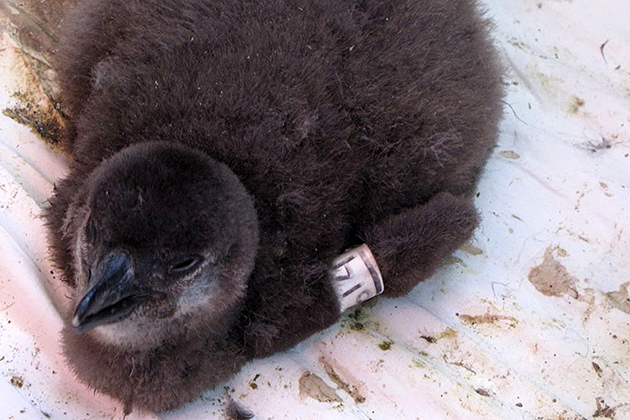
UConn alumna Laurie Macha has a passion for penguins.
Macha ’87, ’91 (CANR) is supervisor of penguins and pinnipeds at Mystic Aquarium, where she has worked with the black and white flightless birds for more than 20 years.
“I’ve developed a real passion from being around them” she says. “They all have individual personalities, and even after all these years I’ll see a particular behavior, one that I’ve seen hundreds of times before, and I’ll still go, ‘hey, look at that!’”
Macha’s passion is the reason she travels to South Africa for what has become an annual effort to save hundreds of abandoned penguin chicks. The rescue effort, organized by the Southern African Foundation for the Conservation of Coastal Birds (SANCCOB), depends on Mystic and other aquariums throughout the world to provide volunteers who are skilled in the care of this endangered species.

This year Josh Davis ’10 (CANR), a penguin trainer at Mystic, also made the trip. He says making his first visit to SANCCOB’s headquarters and participating in the effort to save approximately 300 baby chicks was a dream come true. “I didn’t expect to go this year because I’m a relatively new employee with lots to learn, but the world economy has cut into the number of volunteers being sent to help SANCCOB with the rescue, and Mystic [Aquarium] so strongly supports the effort that they agreed to let me go.”
For reasons that are not totally clear, the population of South African penguins has dropped precipitously from approximately 141,000 breeding pairs in 1956 to a wild population of only 21,000 breeding pairs today.
Macha made her first penguin rescue trip to South Africa in 2000 following the sinking of the ore carrier MV Treasure and the spill of more than 1,300 tons of oil in prime breeding grounds on Robben and Dassen Islands. She says she’s seen a dramatic difference in numbers.
“We really don’t know why there’s been such a decline overall,” she says, citing as possible causes the lack of a food supply, ocean pollution, and changing weather patterns. “What we do know is that African penguins can breed year round and they also molt, or lose their feathers, once a year. What seems to be happening is that they have one clutch, which they raise successfully, but by the time they are nurturing a second clutch they begin to molt. When that happens, they leave the nest to forage for food and the baby chicks are left to starve.”

This is where SANCCOB steps in. Chicks are picked up from breeding grounds where they have been orphaned and brought to a nursery as part of the African Penguin Chick Bolstering Project which is sponsored by the Bristol Conservation and Science Foundation (United Kingdom).
At the permanent nursery at the Rietvlei Wetland Reserve in Table View, the chicks are subject to an exhausting (for the volunteers) regime of feeding, medicating, record-keeping, and surrogate parenting.
Rescue activities take place in November and December, summertime in South Africa, when chicks are brought to the center. They are cared for until they are determined to be healthy, and then returned to the wild. But the process is demanding.
“There is a lot to do in one day,” says Davis. “During my scheduled hours, each of the approximately 60 penguins in my care had to be fed twice. In addition, the majority of them needed to be tube fed a special nutrient-rich formula, and some needed to receive medication, water, darrows [an electrolyte solution], or other special attention.”
Macha particularly enjoys figuring out the penguins’ individual personalities while taking care of them. At Mystic, where there are approximately 26 penguins in residence, the process can be somewhat leisurely, and the foibles of individual birds can be taken into consideration. However, at the rescue site, the penguins need to be handled and cared for whether they like it or not.
“These are wild birds,” she says, “and they are fearful in their new surroundings, especially at first, and they are more than willing to try to bite the hand that feeds them.”

Over time, however, relationships with individual birds can form and one of the chicks in her care, officially #614, earned the nickname ‘Stout’ – which is Afrikaans for ‘naughty’ – due to his propensity for escaping his pen and getting into mischief.
Macha admits he was a favorite of hers, in spite of – or perhaps because of – his feisty nature. However, like the other orphans cared for by SANCCOB, little Stout was eventually released to resume life in the wild. It is hoped that he and the other chicks that are rescued will help to at least slow the path toward extinction that faces the South African penguin population.
“It sometimes seems like a losing battle,” says Macha, “but we continue to fight for the survival of this species in the wild because we absolutely know it’s the right thing to do.”
Watch the African penguins at Mystic Aquarium on the Penguin Webcam.
And see why penguins on South Africa’s Robben Island cross the road.


